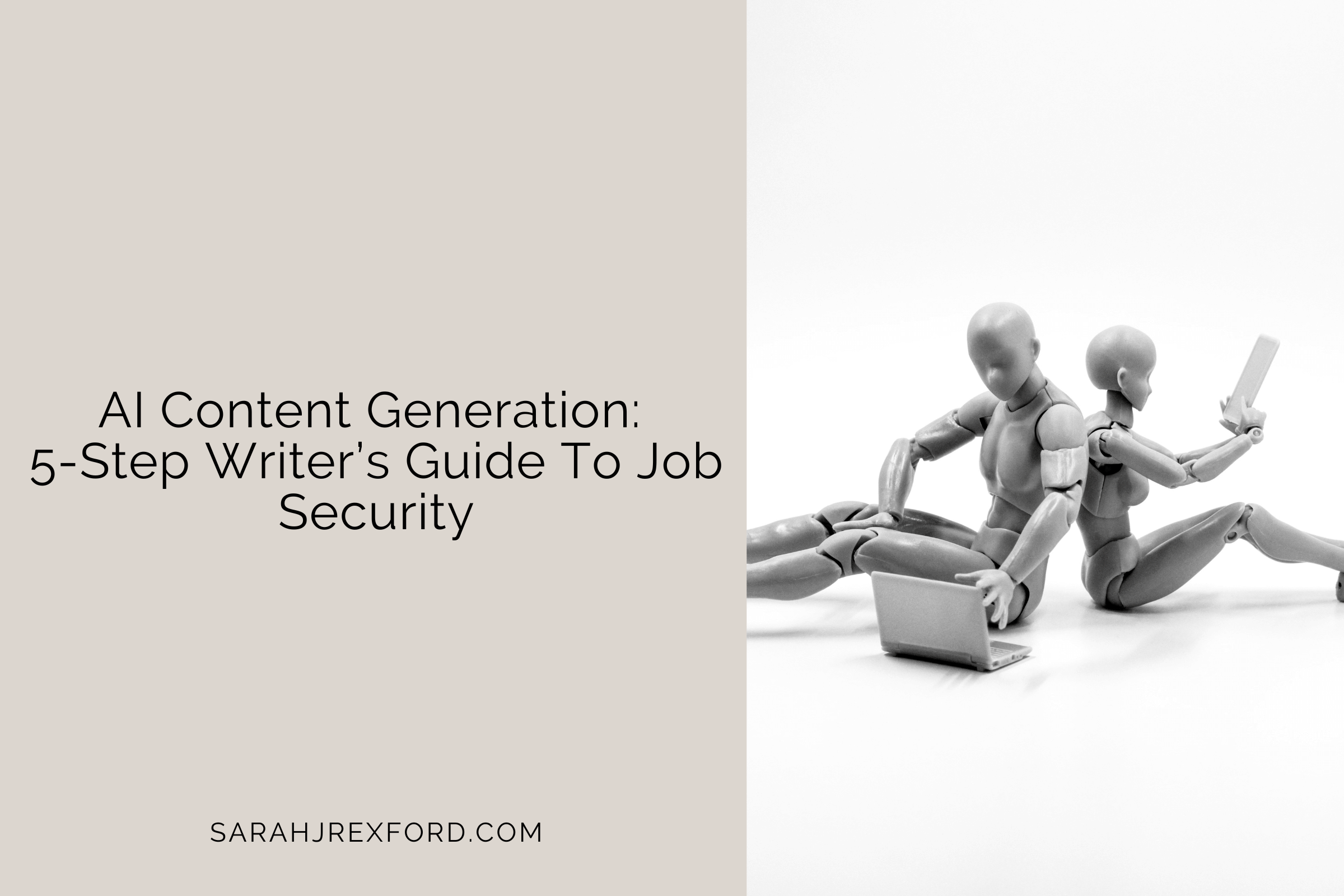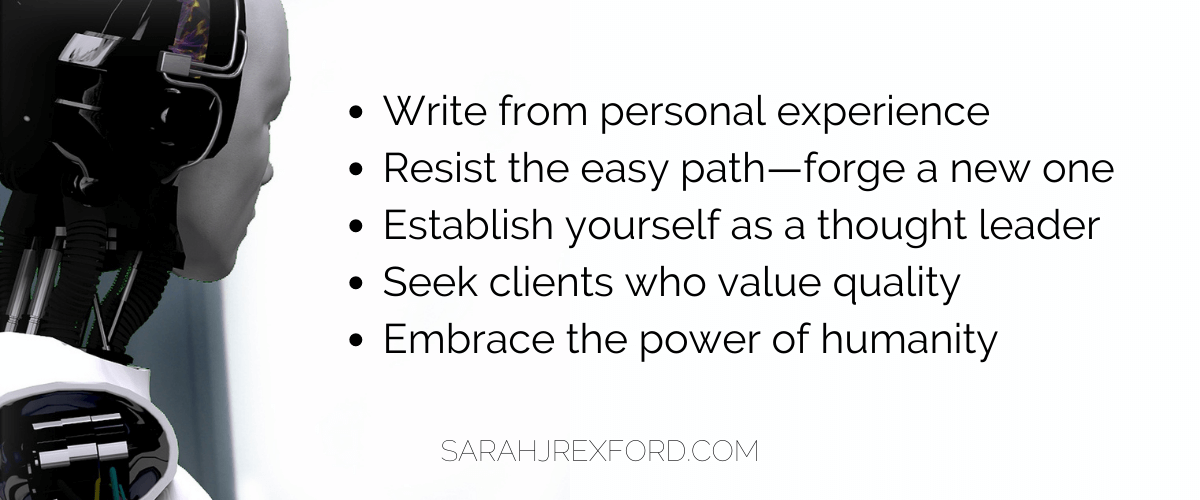AI Content Generation: 5-Step Writer’s Guide To Job Security
Individuals have traditionally viewed AI content generation as a way to collect and assess data—a left-brained intelligence that would never become a threat to writers. However, thought-leaders refer to a new wave of AI that is taking a more right-brained approach.
Rather than use AI to do the data-focused work we don’t want to, AI now outputs work that content creators such as writers and copywriters once did. With AI generated content seeming to take the world by storm, what does this mean for creative writers?
If creating content via the written word is your passion, you may find yourself worrying about your future job security. The good news is there are many professionals who speak into this topic and provide thoughtful next-steps for writers and creatives alike. In this article, I share five steps I’ve learned to help you make the most of this new wave of AI by using it to empower your own, authentic writing.
What Is AI Content Generation?
AI content generation is simply content created by machines. The World Economic Forum says that, “Generative AI refers to a category of artificial intelligence algorithms that generate new outputs based on the data they have been trained on. Generative AI creates new content in the form of images, text, audio, and more.”
If copywriting jobs, creating ad copy, or another form of writing makes up the majority of your income, the above definition may make you nervous. Before getting too anxious, let’s discuss what actually powers AI.
What Powers AI Content?
If you look deeper into AI content creation tools, you’ll quickly see that AI powered content is written via drawing on what’s already been written. The AI writer pulls from copy already published on the internet and then follows this copy by expected words, phrases, and sentences.
What’s the catch? This content needs reviewed. In a recent article on Forbes, Jerry Kelly wrote the following: “AI content generators won’t replace humans, but they can make them more efficient at delivering high-quality content.”
Recently I was part of an AI writing training. A blogger and subscriber to a platform now offering AI generated copy, I joined a call to gain a better understanding of this tool. The trainer told me to choose my keywords, plug them in, and AI would generate my blog.
“Who’s name do I put on my article?” I said.
“Yours,” she replied. “But if you use the same keywords as someone else, your articles will look similar.”
Do I want to take credit for something I didn’t write? Do I want my writing to look like other writers’ content? This session plunged me into a deeper dive into AI, what it is, and how it could impact my work.
AI Writing Assistants: The Plastic Surgeons Of Today
As I learned more, the first main aspect I noticed is this: If AI content generation pulls ideas from copy already on the internet, articles created by AI will, by nature of the process, start to look the same.
In fact, the similarity of content ideas created by AI made me think of my favorite celebrities. Why? Copy generated by AI has a striking similarity to the celebrities who continually undergo plastic surgery to keep up with beauty trends. Whether it’s the alleged removal of buccal fat or various other surgeries, today’s celebrities tend to look more like clones than individuals.
And while changing your facial structure is each individual’s choice, there’s something refreshing about celebrities who refuse to embrace passing trends and instead maintain their own personal look and brand.
With years invested in creating my unique tone of voice, style, and ideas in my writing, two thoughts come to mind:
I don’t want my writing to look like everyone else’s. I want it to stand out because it has my branding all over the tone.
I don’t want AI pulling from my published content instead of hiring me to write it.
So, what’s the answer? Here is a short guide to encourage you as you work to not only keep your writing career, but thrive in it.
Content Writers’ Guide: Keep Your Job And Thrive
Alright writers, I see you. You love writing and want it to eventually support you in place of your day job. In fact, maybe you’re already paid to write landing pages or product descriptions. But now AI is said to generate unique content…or is it?
#1 - Be Vulnerable: Write From Personal Experience
AI may be able to pull its content from other copy, but you are the only one capable of creating authentic writing about your own life. Personally, I’ve always engaged more fully with content that is personable and focuses on storytelling. Life over textbook, so to speak.
Content marketers, whether writers or YouTubers, who focus on sharing from their own life experiences always seem to resonate with me more. Maybe it’s because I’m human and connect with vulnerabilities. I, too, am vulnerable to the happenings in the world around me and the thought processes inside my head.
Writer, I challenge you to write your content from a place of vulnerability and seek to connect with your audiences. This is an angle that not only sells due to its impact, but has the power to change lives.
#2 - Be Creative: Don’t Follow The Easy Path, Forge A New One
With AI writing tools pulling from what’s already been created and relying on natural language processing (NLP) to create new content, there’s a catch: AI generated content is predictable. Dorie Clark and Tomas Chamorro-Premuzic describe it in their article published in the Harvard Business Review:
“At the micro-level, it’s helpful: ‘thank’ is indeed often followed by ‘you.’ But at a macro level, its suggestions tend to homogenize, and they’re only as good as the wisdom of the crowds, which is often the exact opposite of wisdom.”
Robert Frost once wrote the iconic line, “Two roads diverged in a wood, and I—I took the one less traveled by, and that has made all the difference.” Make a difference in your writing. Don’t choose the predictable path. Instead, forge a new one.
#3 - Establish Yourself As A Thought Leader
To a certain extent, every content creator must draw ideas and content from what’s been done. Think of it as the centuries-old story structure: Beginning, climax, end. Then consider the themes that dominate stories: Hero’s journey, coming of age, good versus evil, love, revenge, survival, etc.
As creatives, we draw inspiration from what’s already been done. In this new wave of AI generated content, choose to establish yourself as a thought-leader in your field rather than simply recycling information that’s already common knowledge.
Similar to point two, don’t rely on drawing from what’s already known, share your new discoveries.
#4 - Seek Clients Who Value Quality
If you’re a writer seeking to establish yourself, it’s sometimes difficult to find guest posting opportunities at well-known publications. Your credibility hasn’t yet been vetted. Additionally, many name-brand publications value quality over quantity.
They won’t accept every pitch because they only want to publish quality articles written by individuals they know. These top-tier clients won’t know the quality of your writing unless they know your name.
Take this mindset when it comes to your writing work. Seek out clients who value the quality of unique, formulated content over the speedy, yet predictable, content of AI. I’d argue that branding for writers has never been more vital.
#5 - Embrace The Power Of Humanity
People connect with the personal, human aspects of topics. It’s the classic pathos employed in literature. Remember the early tip of advice for Facebook? The New York Times reminds us that “What’s common sense in real life is common sense on social media.”
The power of humanity is connection. With connection, or social proximity as some call it, comes strength.
When I first started out as a writer, I had the privilege of training under a bestselling author. One of my biggest takeaways over the years of this mentorship was not the writing rules he taught but the personal encouragement. He shared that creative writing feels daunting at times, even for him.
Receiving advice from someone who understood the emotion behind the creative process was invaluable. We are human so we are always in flux. We are always learning new ways of doing things. I’ve found when I write from a place of vulnerability my audience connects with my writing at a much deeper level.
Set The Trend, Don’t React To Trends
While there is a place for streamlined tactics (such as using AI to generate similar content in a new format), there is still a tremendous need for original writing. We live in an ever-changing, always evolving world, not a static environment. This is where human originality comes in.
I’ll leave you with a quote: “Whenever we let Gmail autocomplete our searches or emails, we relinquish a bit of originality and uniqueness, turning AI’s prediction into a self-fulfilling prophecy that makes us more predictable.”
And while it’s up to you to take charge of your writing career and find your unique place in a fluctuating industry, there is a need for you. Use software as you can to aid you in your writing, but don’t forget to stay original. You’re the writer and it’s your voice that matters.


